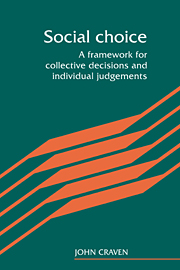1 - Introduction
Published online by Cambridge University Press: 15 September 2009
Summary
Social choice theory
Social choice theory is a subject of very general application. It concerns the possibility of making a choice or a judgement that is in some way based on the views or preferences of a number of individuals, given that the views or preferences of different people may conflict with each other. This book provides both an introduction to and an overview of social choice theory. It is not a comprehensive survey of all the literature on the subject.
The problems addressed in this book have a common theme, but come with many variations. The central problem was demonstrated by Kenneth Arrow in his Social Choice and Individual Values (1951) where he showed that, if one imposes some apparently reasonable conditions on, for example, an election system, one finds that the system is undemocratic; indeed, one individual has dictatorial powers. Election systems are not the only contexts where this devastating result is important, and, in this chapter, we look at several other areas, including economic and moral contexts, in which social choice theory applies.
In chapters 2 and 3 we introduce the basic theory, first by establishing a formal framework for thinking about social choice, and then by showing Arrow's result itself.
- Type
- Chapter
- Information
- Social ChoiceA Framework for Collective Decisions and Individual Judgements, pp. 1 - 12Publisher: Cambridge University PressPrint publication year: 1992



